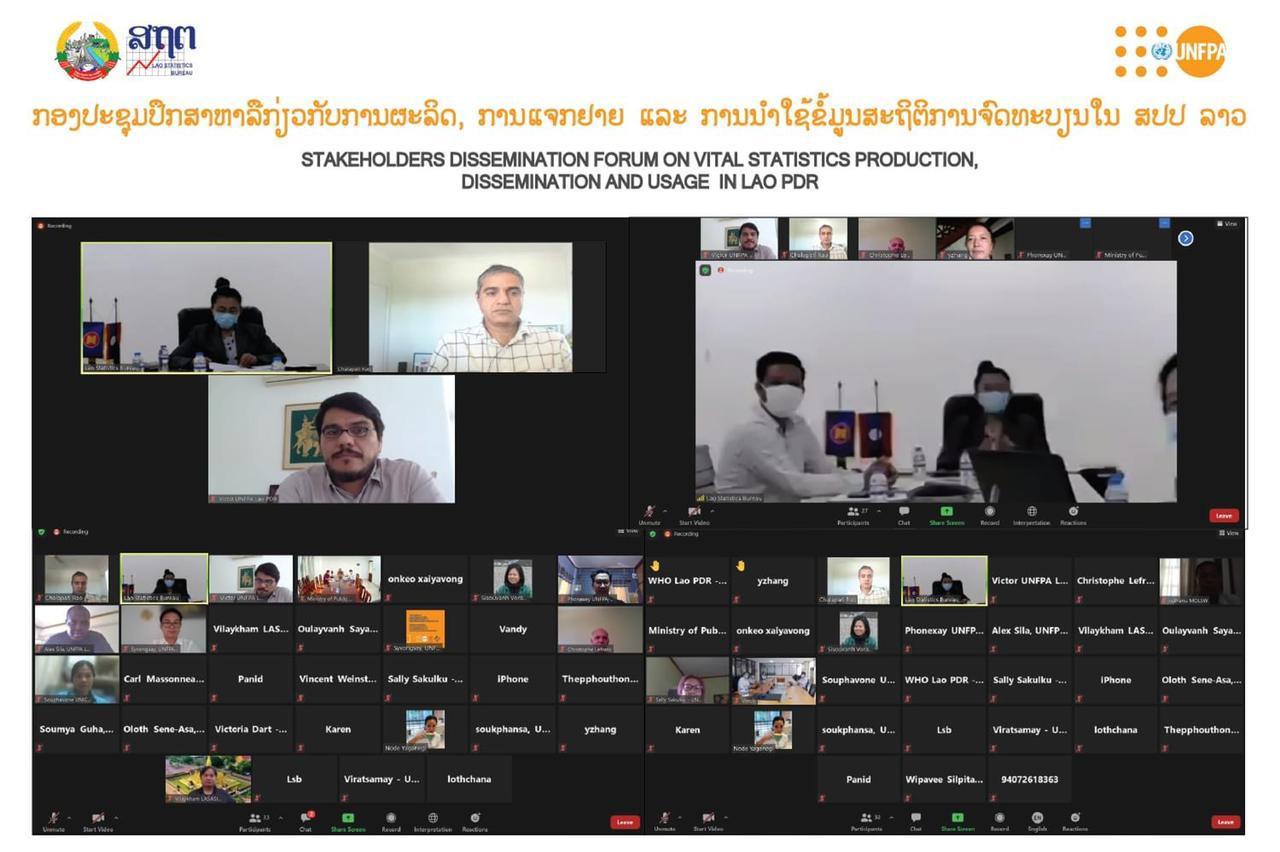-Vientiane Capital, 18 June 2021 - The Lao Statistic Bureau (LSB), Ministry of Planning and Investment in collaboration with the United Nations Population Fund (UNFPA) conducted a dissemination workshop today to present the key findings and recommendations for the vital statistics production, dissemination and usage assessment including discussing challenges, opportunities and ways forward in strengthening the CRVS in Lao PDR.
“I would like to express my gratitude to UNFPA for its continued support in mobilizing financial and technical assistance to assist Lao PDR in planning and monitoring programs and policies, particularly in the areas of population and statistics,” said Ms. Thirakha Chanthalanouvong, general director of the Social Statistics Department, Lao Statistics Bureau (LSB), Ministry of Planning and Investment.
She added that “the findings of this research are expected to help in the identification of critical and necessary lessons for domestic action, as well as lessons from other countries in the region and internationally. This includes capacity building and implementation recommendations, as well as systematic data registration, analysis, and use of data in accordance with international standards.”
From a traditional perspective, having a proof of an official record from the Family Book was considered to be adequate documentation for civil purposes. However, there is greater current awareness that while such local registration was previously considered as a proof of identity, currently there is a need for a birth certificate as an official record that enables the rights of citizens in broader society for economic participation, social protection, and gender equality, among others. The civil registration vital statistics (CRVS) system is essential for identity management, and generation of timely and reliable statistics on fertility, mortality, and other vital events for policy and program purposes.
There have been various international initiatives to strengthen CRVS systems, for instance, the United Nations Economic and Social Commission for the Asia Pacific (ESCAP) region launched the CRVS Decade 2015-2024 ‘get in the picture’ initiative that is being implemented through a comprehensive Regional Action Framework that has been adopted by all regional Member States. This action framework includes a charter of activities and targets for coverage, completeness and quality of Civil Registration and Vital Statistics with specific mid-term and decadal targets for performance achievement.
To further support these international CRVS development activities, the United Nations Population Fund (UNFPA) commissioned this assessment to advance the Asia-Pacific regional CRVS initiative and specifically identify opportunities and challenges in the area of vital statistics production, dissemination and usage across the region and will also serve to inform the contribution of UNFPA to the Asia-Pacific Second Ministerial Conference on Civil Registration and Vital Statistics, to be organized in November 2021.
As part of a regional situational assessment of national vital statistics practices in UNFPA Asia Pacific countries, three countries (Lao PDR, Indonesia and Pakistan) were nominated for an in-depth case country specific evaluation. Specifically, in Lao PDR this assessment aimed to investigate local factors from both administrative and technical perspectives that can influence the structure, operations and functional status of the national CRVS system. The outcomes from the case study will provide important lessons for strengthening and evaluating the performance of national vital statistics systems in other countries in the region.
The findings from the Lao PDR country case study revealed there are comprehensive efforts to strengthen the national CRVS system. To enhance the capability in vital statistics production, dissemination and usage it requires the use of standard forms for registering the vital events across the registration centres, monitoring and data quality audit checks, timely generation of vital statistics reports and capacity building at all levels of implementation.
Mr. Victor Valdivieso, UNFPA Deputy Representative to Laos said “policy and decision-makers depend on sound and timely statistics for policy development, and for programme monitoring and evaluation.” He emphasized the need for reliable vital statistics across the life course to inform planning and decision making on social and economic development. “The renewed commitment through the 2030 Agenda and ICPD Programme of Action provides a real opportunity to transform societies and their administrative data systems to be fully inclusive across the entire life-course – from birth to death.”
Mr. Valdivieso also highlighted that connecting of vital events registration to the gender equality agenda, provides a platform to ensure that civil registration strengthening efforts and vital statistics outputs are not only gender sensitive, but gender transformative oriented to reduce preventable maternal deaths, end harmful practices such as child marriage and gender-based violence, and ensure that women and girls are clearly visible and fully integrated into development policy and programs.
************
UNFPA, the UN's sexual and reproductive health agency, works in over 150 countries including Lao PDR, to achieve zero maternal deaths, zero unmet need for family planning and zero gender-based
For more information please contact:
Mr. Phonexay Sithirajvongsa,
Monitoring and Evaluation Officer, UNFPA Laos
Mr Vilaysook Sisoulath,
Deputy Director General of Social Statistics Department, LSB


